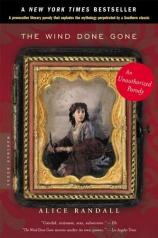Reading Group Guide
Discussion Questions
The Wind Done Gone

1. The Wind Done Gone is a novel written in the form of a first-person diary. How would you describe Cynara's voice? How does her language evolve over the course of the book?
2. Mammy is a very complex character: a lover, friend, mother, nurse, and possible murderer. To whom does she give life? Who suspects that she is a murderer? Who is she thought to have murdered? What is the nature of her relationship with Lady? How does the relationship change? What is the nature of her relationship with Other? How does this relationship change? What does Garlic mean when he states over her grave that she is the true mistress of the house?
3. Vengeance is an important theme in this novel. The act of writing a parody of another novel can be understood as an act of literary vengeance. Which character achieves the most explicit and sinister act of literal vengeance?
4. In Southern English the word "tata" is used to mean both "thank you" and "you're welcome," particularly between people of unequal status. It is also means "breast." Tata is the name of the plantation house in which Cynara is born. What does the house look like? Who designed it? What does the house Tata suggest about the nature of African-American intellect?
5. The Wind Done Gone makes significant use of a variety of homonyms (words that sound alike but mean different things). In the very first paragraph we have the word "tiers," evoking the word "tears," and the word "peridot," evoking the word "parody." Here Mammy has a first name, Pallas. How does this name enhance our sense that the people of Tata are living in the breast of Mammy?
6. The cakewalk was a plantation dance in which blacks competed against other blacks to ridicule and scorn the way plantation aristocrats danced their quadrilles. With this in mind, how does the fact that R. gives Cynara a cake foreshadow the notion that Other is part black? Where else is the word "cakewalk" mentioned in the novel?
7. What makes the Congressman attractive to Cynara? What vow does she break to be with him? What impact would the relationship with Cynara have on the Congressman's career?
8. Cynara's relationship with R. begins when he purchases her as a teenager. In what sense can she be described as a sexually abused child? What evidence do we have that Cynara is emotionally damaged by the relationship? Why does Cynara contrive for R. to meet Other? How does her competition with Other for R.'s affections parallel her competition with Other for Mammy's affections? In what significant way are the relationships different? Why does she marry R.? Why does she leave him? When does Cynara begin to be aware that R. is old?
9. Beauty and Dreamy Gentleman are both presented as gay characters. They are also two of the few white characters who "stay" white. What does this suggest? In what sense does The Wind Done Gone tend to erase the color line?
10. At the end of The Wind Done Gone, a baby is born. Who is the child's father? How is this known? Who is the child's biological mother? Who raises the child as her own? What story in the Hebrew Bible does this bring to mind?
11. If the novel Gone With the Wind suggests that rderer in The Wind Done Gone. In Gone With the Wind, Melanie is presented as the epitome of a sweet, lily-white lady. How is the portrayal of Mealy Mouth a comment on the complicity of Southern ladies in the evils of slavery?
13. The Congressman is not the only black man in Cynarblacks are intellectually inferior to whites, that the proper role of the black mother is to tend a white charge, and that black politicians are inferior, how far does The Wind Done Gone go in rebuking and scorning these claims?
12. Mealy Mouth is presented as a multiple sadistic mua's life. How does Cynara's changing understanding of Garlic's power influence her attraction to the Congressman? Who is Cynara's first black male suitor? What is his claim on her heart?
14. Cynara is an herb finder, a loan maker, a songwriter, a diarist, a lover, a friend, and finally a mother. In each of these roles she is uniquely vulnerable and uniquely gifted. In which role is she most successful?
15. How does Cynara's experience as a servant influence her dealings with servants and tradespeople?
16. The scope of Cynara's world extends beyond the American South. Atlanta is not the dominant city. To what other cities does Cynara travel? What city influences her most? How is the geographical position of this city significant?
17. Throughout the book runs the theme that things or beings that look the same can be very, very different: Cynara, Other; emeralds, peridots, green glass; killing herbs, curing herbs. In what sense does this theme compel the reader to play close attention?
18. The great political tragedy of Gone With the Wind is the South's loss of the Civil War. The great political tragedy of The Wind Done Gone is the end of what?
19. What does the butterfly on Cynara's cheek signify?
20. If you were told that there is an African-American tradition of coded language, how would you connect this novel to that tradition? What does it mean for a book to talk back to another book?
The Wind Done Gone
- Publication Date: April 8, 2002
- Genres: Fiction
- Paperback: 224 pages
- Publisher: Mariner Books
- ISBN-10: 0618219064
- ISBN-13: 9780618219063







